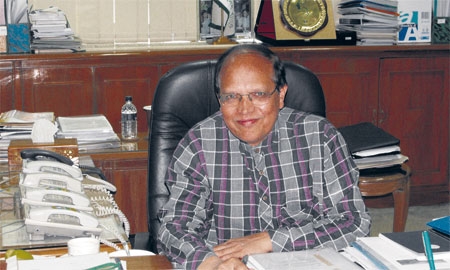The borders of Bangladesh as they stand today were established back in 1947 with the Eastern region of Bengal becoming East Pakistan, the eastern part of a new country Pakistan, separated by over 1,600 kilometres of Indian territory from West Pakistan, the Western part. Political exclusion, ethnic and linguistic discrimination, and economic neglect by the politically dominant West Pakistan kept breeding resentment and unrest in East Pakistan, eventually leading to the War of Liberation that ended on December 16, 1971, with surrender of the Pakistani occupation forces to a joint command of Indian Army and Bangladesh liberation forces at Dhaka, the capital of the new Peoples Republic of Bangladesh. Branches of the State Bank of Pakistan in the erstwhile East Pakistan were reconstituted by the government of Bangladesh as Bangladesh Bank, the central bank of the new country.
Sheikh Mujibur Rahman, founding father of the new nation, had a socialist agenda; and accordingly the government nationalised all banks in 1972 to ensure channelling of the country’s funding resources to high priority sectors for the reconstruction of the war-ravaged country with the restoration of industry and agriculture. However, the administration’s inexperience with state control of various sectors prevented banks from functioning as they should. In the initial years in regime of directed lending at prescribed interest rates the meagrely capitalised nationalised banks kept on handing out loans without commercial consideration driven due diligence. Legal processes for recovery of defaulted loans were hopelessly slow in the nascent judicial system, and non-performing loans kept piling up. While the government in the early years made a point of intervening in all possible areas, proper regulatory and supervisory processes for timely diagnosis and redressing of problems were not in place. As such, in the early years after independence, banking concepts like liquidity and profitability became alien to many financial managers, with capital adequacy and solvency taking backseats.
Financial sector reform initiatives taken up in the 1980s brought back private sector bank ownership and lending on commercial considerations; from early 1990s directed lending was abolished, and interest rates were freed up. From then on Bangladesh Bank has been steadily pursuing updating of local financial sector regulatory and supervisory practices structures towards full convergence with international best practice standards, including the Basel Committee risk-based capital standards and liquidity buffers.
"WE ARE MUCH, MUCH CHEAPER THAN BOTH CHINA AND INDIA IN TERMS OF LABOUR COSTS. WE CAN OUTBID ANYBODY FOR MANY YEARS TO COME."
DR ATIUR RAHMAN, Governor of Bangladesh Bank
|
Dr Atiur Rahman, the incumbent Bangladesh Bank Governor, is keen to point out that despite the teething period problems of the earlier years the Bangladesh economy has been growing steadily over the years, and is now on firm footing on a path of faster growth over the coming years. He insists that it is this future rather than the past that should be of most interest and relevance for investors. “Bangladesh is an untold story, an unearthed secret, waiting to come out to the world. A new, inclusively growing, socially and environmentally responsible Bangladesh is emerging outside the glare of centre stage and beyond the traditional Western vision. This Bangladesh is resilient, innovative, very forward looking and liberal in attitude.” Bangladesh Bank has now progressed vastly from the initial shaky start to presiding over a dynamically growing, robust and stable banking sector, with proactive reforms in regulatory and supervisory standards and the introduction of practices like stress testing. This dynamic financial sector is capably supporting steady output growth in the economy. “Our 6.7 per cent FY11 real GDP growth target was attained, and the economy is on course for attaining the 7 per cent growth target for FY12,” said Governor Atiur. “Exports and imports both grew by more than 40 per cent y-o-y in FY11. The composition of imports was remarkable, with only about one seventh in consumption goods and all the rest in capital goods and production inputs. BB’s financial inclusion campaign embraced enthusiastically by banks is promoting credit flows to the productive, income and employment-generating micro, small and medium-scale enterprises throughout Bangladesh, hastening poverty reduction. This is evidenced in the recent substantial rise in rural real wages and in attendant decline in poverty.”
Governor Atiur sees the growing population of young and willing workers throughout Bangladesh as an important advantage. “We are much, much cheaper in labour costs than both China and India; we can outbid other countries on this count for many years to come. I’ve heard of a Western automobile manufacturer getting their car interiors designed by teams in Bangladesh. Senior representatives from many leading global IT sector corporates visiting Bangladesh have expressed keen interest in utilising our upcoming crop of young tech-savvy manpower. Foreign investors in the apparels and other light export manufacturing sectors, including those from China, India, Korea and the Gulf region, have bought up or set up manufacturing units in Bangladesh. The electricity and gas shortages impeding these processes are now being addressed which by themselves are investment opportunities for foreign investors.” Governor Atiur recognises the important role that foreign investors, particularly the larger multinationals, can play towards faster economic growth in Bangladesh, bringing in global marketing clout besides output technology and investment capital. Recalling the role of capital market development side by side with financial sector development, Governor Atiur points out that except for volatile short-term capital flows in the money and credit market, non-resident owned direct and portfolio investments can enter Bangladesh freely; and post tax profits/dividends and disinvestment proceeds thereon can be freely repatriated abroad in convertible currencies. Further information on these foreign investment facilities in Bangladesh can be accessed from such sources as Bangladesh Bank, Board of Investment and the Bangladesh missions abroad.

0 COMMENTS